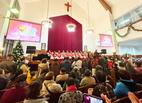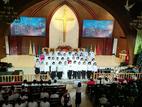“In recent years, the influence of heretical cults in our local areas can be said to be minimal, and it will not affect the normal gathering orders of various grass-roots churches,” said Pastor Z, from eastern Fujian, in a recent interview about the heresy situation in the local church.
The pastor’s city is an ancient city with a deep foundation of evangelism. At present, there are more than 100 registered churches and more than 200 gathering places in the city. After face-to-face visits and exchanges, it relied on the sound and complete church management system established by the local CC&TSPM.
In many grass-roots churches, in order to manage scattered gathering points, they often adopt the system of dividing districts for management, while in the local area, the pastoral area management system has been made more detailed and powerful.
“The healthy operation of grass-roots churches should be based on a cohesive system.” Pastor Z, who has served for many years as the head of the Municipal CC&TSPM, always agrees with this view.
At the end of the 1990s, in order to help the fledgling urban and rural churches establish a perfect management system at that time, Pastor Z led the local CC&TSPM to take the lead in starting with the Church Committee and formulated unified rules and regulations throughout the city. “The church committee of each church needs to be composed of 12 members. Except for one senior pastor who lives in the church, the remaining 11 church committees are responsible for the academic affairs group, church affairs group, finance group, and other duties in the church,” Pastor Z introduced.
On the basis of the church committee system, the municipal CC&TSPM has classified hundreds of churches in the city into several pastoral areas according to regions, in which each pastoral area manages seven to eight grass-roots churches, while the head of the pastoral area is the pastor in charge of the main churches in the region, who is mainly responsible for uploading and distributing news and contacting and caring for them.
Every month, every pastoral area in the city will hold regular pastoral transportation meetings. The meeting requires the senior pastor and a church committee of each grass-roots church to attend the meeting on time and exchange their pastoral progress, ministry progress, spiritual warfare, and various other aspects of their work.
“The establishment of the monthly meeting system in pastoral areas has greatly helped our local work of resisting infiltration from cults.” Speaking of this, Pastor Z explained with specific examples from previous churches - before the outbreak of the epidemic, a few heretics would infiltrate into the church to try to poach believers. When the grass-roots church was disturbed, the pastor in charge of the church would inform the whole pastoral area about the heretics in time through the monthly meeting of the pastoral area. Then, the pastor in charge of the pastoral area would directly inform the Municipal CCC & TSPM, which finally would issue a warning to the grass-roots churches in the city.“ Thanks to the timely notification of the monthly meeting in pastoral areas, in recent years, all grass-roots churches in the city have become more of one mind in fighting heresy, and heretics can be said to have 'nothing to hide here',” the pastor said frankly.
Weaving the church’s protective net against heresy with a sound church management system is a beautiful practice of Pastor Z’s city in years of exploration. However, for Pastor A in North China, summing up this experience, which can be called “all roads lead to the same goal” has paid a heavy price.
In an interview in the spring of this year, Pastor A in North China talked about the situation of his church colleagues being infiltrated by a heretical cult network. On the other end of the phone, the pastor’s voice revealed anxiety, helplessness, and exhaustion, which were still painful in retrospect. However, for the pastor from the church in the fifth-tier cities, apart from the loss of valuable colleagues, what makes him feel deeply sorry is that the information between the churches in the grassroots cities is not smooth.
“When I first learned about the existence of this heresy from familiar pastors in neighboring cities, they had secretly infiltrated our church for less than half a year.” Pastor A said, “If it weren't for the personal communication between our pastors, I wouldn’t have been able to know how long the heresy had ‘coexisted’ with us.”
However, what makes him feel even more dismayed is that the provincial church, which is just over 100 kilometers away, started the special prevention work against this cult as early as half a year ago, but it never issued a warning notice to the churches in other surrounding cities except for the warning in its area.
After the situation with this particular cult, Pastor A got a new job after the pastoral meeting. He started to launch his own network of pastors, focusing on following up on the infiltration of this cult in churches in North China and even all over the country. “We can be infiltrated in such a small place here, and I’m afraid the situation of churches in other places is not optimistic. The more churches know, the sooner this cult can be blocked from infiltrating among the grassroots churches,” said the pastor.
In the process of communication with the above two pastors, they mentioned the decisive role of CCC&TSPM in the establishment and implementation of the system. Pastor Z, the old pastor, said: “The local Christian CC&TSPM should become more powerful ‘leaders’ and ‘executors’, take on the functions of supervising, managing and guiding the grass-roots churches with the help of a sound management system. Meanwhile, establish a solid guarantee for the treatment of teachers and pastors. But the most important thing is not to forget the essence of serving the church.”
In this regard, Pastor A of North China also gave a favorable view. At the same time, he added that if grass-roots churches wanted to unite well, there were still many drawbacks and limitations only by the spontaneous contact between churches. “I hope the system can be more established so that each grass-roots church can have closer ties, and don’t let the things in our church happen in other sister churches.”
- Translated by Charlie Li










